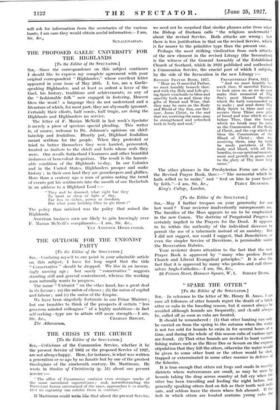THE CRISIS IN THE CHURCH • [To the Editor of
the SPECTATOR.] Siu,--Criticisms of the Comniunion Service, whether it be the present Service of 1662 or the proposed Service of 1927, are not always happy. Here, for instance, is what was written a generation or so ago by no fanatic but by one of the greatest theologians of the nineteenth century, Dr. Martineau. He wrote in Studies of Christianity (p. M) about our present Service :- " Tho office of Communion contains even stronger marks of the same sacerdotal superstitions ; and, notwithstanding the Protestant. horror entertained of the mass, approaches it so nearly, thRt no ingenuity can exhibit them in contrast."
If Martineau could write like that about the present Service, we need not be surprised that similar phrases arise from what the Bishop of Durham calls " the religious underworld" about the revised Service. Both attacks are wrong ; but there is less justification in that on the revised Service, which is far nearer to the primitive type than the present one.
Perhaps the most striking vindication from such attacks of the new element in the revised Liturgy (the Invocation) is the witness of the General Assembly of the Established Church of Scotland, which in 1928 published and authorized a Communion Service, the crucial part of which I subjoin, by the side of the Invocation in the new Liturgy :—
REVISED PRAYER Booir, 1927. PRESBYTERIAN FORM, 1923.
" Hear us, 0 merciful Father, " And we most humbly be. we most humbly beseech thee, seech thee, 0 merciful Father, and with thy Holy and Life-giv- to look upon us, as we do now
ing Spirit vouchsafe to bless and sanctify both us and these thy make that memorial of Thy
Son's most blessed Sacrifice
which He hath commanded us gifts of Bread and Wine, that to make ; and send down Thy
they may be unto us the Body Holy Spirit to bless and con- and Blood of thy Son, our Sav- secrate these Thine own gifts iour, Jesus Christ, to the end
of bread and wine which we set that we, receiving the same, may before Thee, that the bread be strengthened and refreshed which we break may be unto both in body and soul." us the Communion of the Body of Christ, and the cup which we bless the Communion of the Blood of Christ ; that we, receiving them, may by faith be made partakers of His body and blood, with all His benefits, to our spiritual nourish- ment and growth in grace, and to the glory of Thy most holy name."
The other phrases in the Presbyterian Form are also in the Revised Prayer Book, thus :—" The memorial which he hath willed us to make," and " feed on him in your hear0














































 Previous page
Previous page